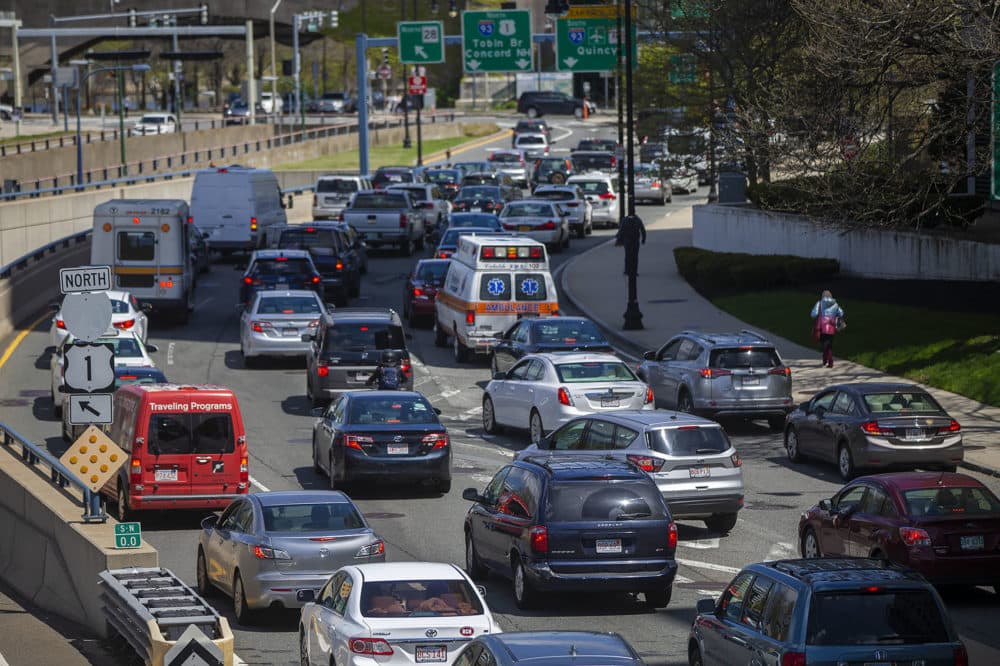Advertisement
New EPA Rules Will Increase Air Pollution As The World Suffers A Respiratory Pandemic

In less than a week, the federal Environmental Protection Agency (EPA) announced two policy changes that could have far-reaching consequences for the air above Massachusetts.
On March 26, the EPA announced it would temporarily stop enforcing certain environmental monitoring and reporting requirements during the COVID-19 pandemic, retroactive to March 13. On Tuesday, the agency issued a final rule weakening Obama-era fuel economy and emission standards.
Scientists, public health experts and environmental advocates swiftly condemned both policy shifts, saying they would increase greenhouse gas emissions that contribute to climate change, as well as short- and long-term air pollution. Many critics zeroed in on air quality as a particularly pressing issue, given that the current coronavirus pandemic is more deadly for people with existing lung conditions.
"Clearly we'll have more pollution, and that will mean more people with asthma, more people with chronic obstructive pulmonary disease," said Georges Benjamin, executive director of the American Public Health Association. "It's going to make the health of those populations who are exposed much worse."
While there is no data linking air pollution with an increased risk of contracting or dying from the new coronavirus, a 2003 study about SARS -- a similar coronavirus --found that patients from areas with heavy air pollution were twice as likely to die from SARS as those from regions with low pollution.
"I have been really troubled by the lack of enforcement and the rollback of the clean car rule, at the moment we're having a respiratory health crisis," said Elizabeth Henry, president of the Environmental League of Massachusetts. "I find it heartbreaking."
Relaxing Enforcement
The temporary EPA policy announced on March 26 introduced a policy of "enforcement discretion" — if companies or facilities could not monitor or report air emissions or water discharges because of the coronavirus pandemic, then they were off the hook. The policy does not extend to criminal violations, Superfund sites or drinking water supplies.
But many environmental advocates, like former EPA director and current president of the Natural Resources Defense Council (NRDC) Gina McCarthy, see the new policy as a "license to pollute."
"I was at EPA as the administrator under the Obama administration, so I got pretty familiar with how enforcement actions are taken," said McCarthy. "I've never seen anything like this."
The EPA declined a request for an expert interview, and also declined to answer questions via email.
McCarthy noted the EPA already has a built-in system for relaxing enforcement under certain circumstances. And while there might be a situation during this pandemic where social distancing could affect a company's ability to monitor or report emissions, she couldn't think of one offhand.
Advertisement
"There could be an instance," she said. "But to simply give it to every industry that exists in the United States of America is shameless."
The NRDC on Wednesday filed an emergency petition asking that any company or facility that stops monitoring or reporting its pollution to inform federal and state authorities, as well as the public.
"So if you're living next to a refinery that says it can't manage this, but it can manage to actually produce lots of product," says McCarthy, "maybe people will have a better opportunity to protect themselves against the kind of pollution that causes heart and lung disease that make people more vulnerable to coronavirus."
Massachusetts has its own air quality standards, which are enforced by the state Department of Environmental Protection. Although MassDEP confirmed Wednesday that the agency "continues to enforce the environmental laws of the Commonwealth" during the pandemic, the state will likely be affected by relaxed standards elsewhere. As ELM's Henry put it, "air pollution knows no boundaries."
Fuel Standards And Emission Rollbacks
The Obama-era standards required automakers to increase fuel economy for new vehicles by 5% each year through model year 2026. The Trump administration's new rule will require automakers to increase fuel economy by 1.5% each year. The new rule is expected to increase greenhouse gas emissions by about a billion tons through 2040.
“This dirty cars rule will result in vehicles that are more polluting, more expensive, and less safe,” said Massachusetts Sen. Ed Markey, in a statement. “It is especially appalling that Trump would decide to issue a rule now that will result in more dirty air pollution.”
Massachusetts Attorney General Maura Healey announced plans to sue the Trump administration over the rollback.
“With no legitimate scientific, economic, or environmental justification whatsoever, the Trump Administration is throwing away standards that would improve air quality in Massachusetts and across the country," said Healey in a statement.
Public health experts connect increased auto emissions with increased illness.
"Burning fossil fuels is killing millions of people around the world every year, through air pollutants," said Aaron Bernstein, a pediatrician at Boston Children’s Hospital and director of Harvard's C-CHANGE institute. "Air pollutants can increase the risk of people getting sick from viral infections like COVID, as well as bacterial infections."
Critics say introducing this rollback during the pandemic is, at best, insensitive and in poor taste. Others say the Trump administration is taking advantage of the pandemic to advance its agenda.
"They were capitalizing on this crisis to do what they've been wanting to do for three and half years, which is to roll back regulations," said Henry. "I think this administration has proven time and time again its reluctance to look out for environmental protections and public health. And that's part of the reason that we're in this total mess."
This segment aired on April 6, 2020.
